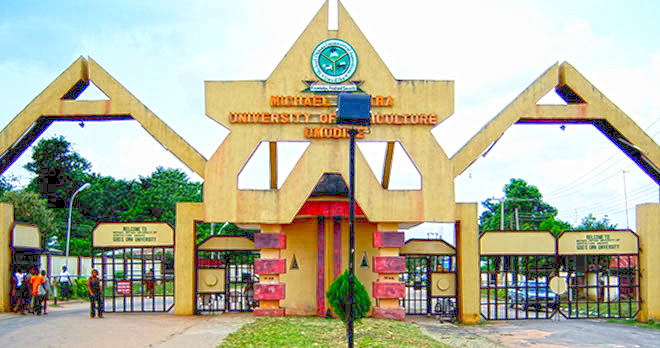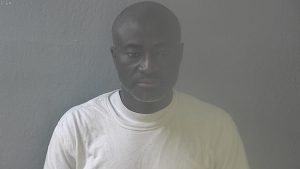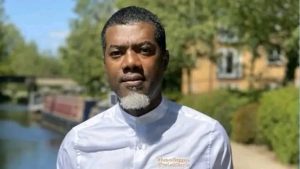Grief at Umudike: Final Year Engineering Student Slumps and Dies on Football Field
It was meant to be an ordinary evening of youthful energy, camaraderie, and lighthearted football among university students. But what began as a recreational match on the football pitch of Michael Okpara University of Agriculture, Umudike, in Abia State, quickly descended into tragedy that would send waves of shock and mourning across the entire academic community. Nwachukwu Omiko, a promising final-year student in the Department of Mechanical Engineering, collapsed mid-game and later died, leaving classmates, lecturers, and administrators grappling with the sudden loss of one of their own.
The university management, through a statement issued by its Chief Public Relations Officer, Ubadire Agua, confirmed the tragic development on Wednesday, May 15. According to the statement, the young man slumped during a football match within the university premises. Immediate attempts by his fellow students to resuscitate him were unsuccessful. The institution’s medical team was quickly alerted, and Omiko was rushed to the Federal Medical Centre in Umuahia in a university ambulance fitted with oxygen and other emergency equipment. Despite all efforts to revive him, Omiko was pronounced dead shortly after arrival at the hospital.
As news of his death spread across the campus, a deep and painful silence enveloped the College of Engineering and Engineering Technology, where Omiko had spent nearly five years of intense academic pursuit. His friends and colleagues, many of whom had only shared jokes and class notes with him hours before his collapse, struggled to come to terms with the finality of the moment.
Described by peers as intelligent, humble, and goal-oriented, Nwachukwu Omiko was reportedly in high spirits when he joined other students for a football match on the day of the incident. He was not just a student; he was also a son, a brother, a friend, and a soon-to-be graduate with dreams of contributing to Nigeria’s development through his chosen career in mechanical engineering.
“He was full of life. Just last week we were talking about NYSC (National Youth Service Corps) plans. He told me he wanted to serve in Lagos and hopefully secure an internship with a manufacturing company,” said a classmate who chose to remain anonymous. “He wasn’t even a very regular player. That day, he just said he felt like stretching his body and joined the game.”
To many in the university community, Omiko represented the ideal student. He was reportedly active in class projects, a member of the Nigerian Society of Engineers’ student chapter on campus, and involved in departmental outreach programmes aimed at promoting STEM (Science, Technology, Engineering and Mathematics) awareness in local secondary schools.
His tragic death raises painful questions about student health and the hidden toll of academic stress, inadequate health monitoring, and lack of awareness about underlying medical conditions. As the university continues to mourn his loss, administrators, staff, and students alike are beginning to reflect deeply on what more can be done to prevent such tragedies in the future.
In the official statement released by the university management, Vice-Chancellor Professor Maduebibisi Ofo Iwe extended his condolences to Omiko’s family, friends, and classmates.
YOU MAY READ
Tragedy in Ogidi: How Five Siblings Died from Suspected Food Poisoning in Anambra
“The Vice-Chancellor, Professor Maduebibisi Iwe, extends deep regrets and condolences of the university to the parents and family of Omiko as well as his colleagues in the College of Engineering and Engineering Technology,” the statement read. The university further expressed its pain at the loss of such a brilliant young mind whose future lay ahead like an unwritten story now abruptly ended.
It is not just in Umudike that the news of Omiko’s passing has struck a chord. Tributes have poured in from students of other institutions, engineering associations, youth groups, and alumni of Michael Okpara University who never met him but feel the sting of the tragedy all the same. For many, Omiko’s death is a reminder of the fragility of life and the importance of physical and mental health awareness among young people.
On social media, the hashtag #RIPOmiko began trending among Nigerian students by the evening of the announcement. Many shared heartfelt posts, pictures of moments shared with the deceased, and calls for universities to invest more in student healthcare and emergency response training.
While Omiko’s death may have come as a shock to many, health experts argue that it reflects a deeper problem within the Nigerian university system: the neglect of student health and wellness in the face of intense academic pressures, insufficient medical infrastructure, and poor health-seeking behavior among young adults.
Medical professionals point out that many students suffer from untreated or undiagnosed conditions such as high blood pressure, congenital heart problems, respiratory illnesses, and diabetes. The academic grind, often characterized by sleep deprivation, poor diet, and lack of exercise, can exacerbate these conditions. Moreover, some students resort to performance-enhancing substances like stimulants and energy drinks to cope with academic pressure, further straining their cardiovascular systems.
Dr. Nnenna Ogbonnaya, a cardiologist based in Umuahia, noted, “Sudden cardiac arrest is not uncommon among young people, especially when they engage in vigorous physical activity without proper medical screening. There are many underlying conditions that don’t show symptoms until it’s too late.”
Omiko’s death, therefore, has sparked renewed calls for Nigerian universities to implement mandatory health screenings for students at regular intervals and before engaging in sports or physically strenuous activities.
In its statement, the university management acknowledged the importance of health checks and urged students to utilize the services provided by the University Health Centre. “We appeal to students to take their health status seriously. Before engaging in strenuous exercises, check in with the health services. Don’t ignore symptoms or warning signs. Prevention is better than cure,” the statement read.
Some students, however, question whether the University Health Centre is adequately equipped to provide such preventative care. Reports from multiple students indicate that the clinic is often under-resourced, with long waiting times and limited medical staff. As one engineering student put it, “The health center tries, but they are overstretched. If the school is serious about health, they should upgrade the facility and staff it with more doctors.”
The Student Union Government (SUG) of Michael Okpara University has called for a full investigation into the incident and promised to work with university authorities to improve student safety. The SUG President, Comrade Chukwudi Eze, in a press briefing, said, “We have lost one of our brightest minds. This is not just a tragedy, it’s a wake-up call. We are demanding comprehensive health checks for all students, especially those participating in sports, and we want the university to take mental health just as seriously.”
Meanwhile, the Faculty of Engineering has declared a week of mourning in honor of Omiko. All academic activities were suspended for 48 hours, and a candlelight procession was organized by his classmates and faculty members. Dean of the College of Engineering and Engineering Technology, Professor Benedict Aroh, described the deceased as “an exemplary student, known for his discipline, brilliance, and quiet commitment to excellence.”
The candlelight procession, held on the engineering faculty grounds, saw hundreds of students clad in black, holding candles and singing dirges as they walked silently through campus in Omiko’s honor. “Today, we walk not just for Omiko but for all students who never got to wear their graduation gowns,” one of the organizers told the press.
Perhaps the most heart-wrenching reaction to Omiko’s death came from his family. His father, Mr. Dominic Omiko, who spoke with journalists from their home in Ebonyi State, said the family was still in shock. “We sent our son to school to get a degree. We were counting the days to his convocation. Now they are asking us to come and take his body. Is this the reward for all our sacrifice?” the grieving father asked in tears.
He described Nwachukwu as the first child in the family and the first to reach final year in a university. “He was our hope. He promised to build us a new house after NYSC. We are a poor family but he made us proud. Now our hearts are broken,” he added.
His mother, too devastated to speak, remained inconsolable as relatives and neighbors trooped in to offer condolences. The family has requested that the university assist in the burial arrangements and offer posthumous honors to the late student.
Omiko’s death is not an isolated case. Over the past five years, there have been multiple reports of Nigerian students slumping and dying during sports or after long academic sessions. Often, these cases are treated as isolated incidents with little or no systemic reforms following them.
Education activists argue that now is the time for a nationwide policy on student health in tertiary institutions. Proposals include annual medical screening, mental health services, emergency drills, provision of defibrillators and trained medical responders on sports grounds, and the integration of wellness education into school curricula.
“Let us not wait until another student dies,” said Ifeoma Agu, a human rights advocate. “Omiko’s death must become the moment we say: ‘Enough is enough.’ We must value student lives as much as we value academic records.”
As Michael Okpara University prepares to resume normal academic activities, the memory of Nwachukwu Omiko lingers like a shadow over the halls he once walked and the classrooms he once brightened. His empty seat in lecture halls, his absence during final exams, and the silence that follows where once there was laughter, are reminders that beyond books and lectures, every student carries a heart, a story, and a future that deserves protection.
In a society often obsessed with results, Omiko’s death urges a pause—a moment to reflect on the human cost of neglecting student well-being.
He may not walk on the convocation stage or wear the graduation robe, but in the hearts of those who knew him and those who now know of him, Nwachukwu Omiko will be remembered not just as a student who died, but as a life that called a university—and a nation—to wake up.





